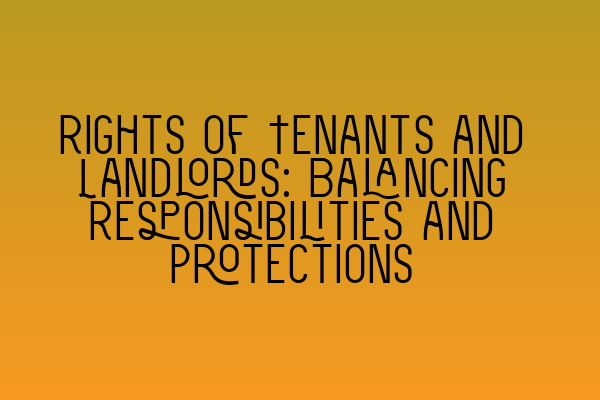Rights of Tenants and Landlords: Balancing Responsibilities and Protections
As a solicitor specializing in property law and land law, it is my duty to inform you about the rights and responsibilities of tenants and landlords. Understanding these rights is crucial for both parties to ensure a harmonious and legally compliant tenancy agreement. In this blog post, I will discuss the key rights of tenants and landlords, and how they can balance their responsibilities to create a fair and secure rental experience.
Before delving into the specific rights, it is important to note that tenancy agreements can vary depending on the jurisdiction and the type of tenancy. However, the underlying principles remain the same. Now, let’s have a closer look at the rights of tenants and landlords.
Rights of Tenants
1. Right to exclusive possession: Tenants have the right to exclusive possession of the property during the agreed-upon tenancy period. This means that landlords cannot enter the property without prior notice and permission unless there is an emergency or a specific clause allowing access.
2. Right to a safe and habitable property: Landlords have an obligation to provide a safe and habitable property to tenants. This includes maintaining the property in a good condition, ensuring essential utilities are in proper working order, and addressing any issues that may pose a risk to the tenant’s health or safety.
3. Right to privacy: Tenants have the right to privacy within their rented property. Landlords should respect this right and refrain from entering the property without proper notice, except in cases of emergency or with the tenant’s permission.
4. Right to request repairs and maintenance: If the property requires repairs or maintenance, tenants have the right to request these necessary improvements from the landlord. Landlords are responsible for addressing these concerns in a reasonable timeframe.
5. Right to be protected from unfair eviction: Tenants are entitled to protection against unfair eviction. Landlords cannot evict tenants without proper legal grounds, such as non-payment of rent, breach of tenancy agreement, or legitimate reasons stated in the relevant tenancy legislation.
Rights of Landlords
1. Right to receive rent: Landlords have the right to receive rental payments from tenants as agreed upon in the tenancy agreement. Tenants are obligated to pay rent on time and in full.
2. Right to proper care of the property: Tenants have a responsibility to take care of the property and use it in a reasonable manner. Landlords have the right to request that tenants maintain cleanliness, avoid damage to the property, and adhere to any other reasonable rules outlined in the tenancy agreement.
3. Right to be notified of any changes: Landlords have the right to be notified of any significant changes, such as subletting, changes in occupants, or extended absences of the tenant. This enables landlords to stay informed and ensure compliance with the tenancy agreement.
4. Right to access the property: Landlords have the right to access the property for certain purposes, such as conducting repairs, inspections, or showing the property to prospective tenants. However, they must provide reasonable notice to tenants and respect their right to privacy.
Balancing Responsibilities and Protections
Achieving a fair balance between the rights of tenants and landlords is essential for a successful tenancy. It is crucial for both parties to have a clear understanding of their rights and responsibilities, as outlined in the tenancy agreement and relevant legislation.
To better understand the legal aspects of property law and land law, you may find our related articles on SQE 1 Practice Exam Questions, SQE 1 Practice Mocks FLK1 FLK2, SQE 2 Preparation Courses, SQE 1 Preparation Courses, and SRA SQE Exam Dates helpful resources.
In conclusion, tenants and landlords must respect each other’s rights and actively fulfill their responsibilities to ensure a transparent and mutually beneficial tenancy agreement. As a solicitor at SQE Property Law & Land Law, I encourage all parties involved in a tenancy to seek legal advice to fully understand their rights and obligations. By doing so, both tenants and landlords can enjoy a secure and harmonious rental experience.
